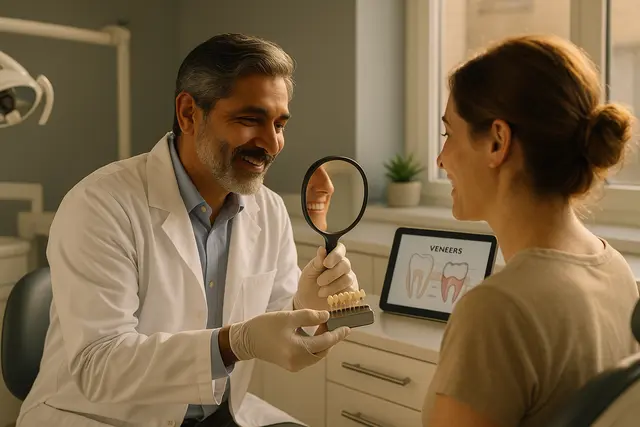Cosmetic Dentistry
6 min read
Mar 21, 2025
How Long Do Veneers Last?
Getting a veneer is like giving your smile a fresh coat of confidence, sleek, smooth, and made to last. But here’s the big question patients always ask right before that final “yes” in the dentist’s chair: How long do veneers last? The answer, as with many things in life, is: it depends. But don’t worry, we’re not here to be vague, we’re here to break it down clearly, honestly, and maybe with a little dental charm along the way.

The Basics of a Veneer
Let’s start with what a veneer actually is. A veneer is a thin shell, typically made of porcelain or composite resin, that’s bonded to the front of your tooth. It’s designed to improve the appearance of your teeth, covering chips, stains, gaps, or irregular shapes. Think of it as a tiny suit of armor that’s both protective and stylish.
Veneers are made to mimic the look of natural teeth, and when done right, they’re nearly impossible to spot. But just like anything that’s used day in and day out (we’re looking at you, coffee drinkers), they aren’t forever.
The Lifespan of Veneers
So, how long do veneers last? The average lifespan of veneers depends on the material and how well you care for them. Porcelain veneers typically last between 10 to 15 years, though with excellent care, some patients find they last up to 20 years. Composite veneers, on the other hand, tend to have a shorter lifespan, usually around 5 to 7 years.
That doesn’t mean composite veneers are a bad choice. They’re more affordable upfront and can be a great option for people not quite ready to commit long-term. It all comes down to the type of veneer you choose and how you treat your teeth after they’re placed.
Porcelain Veneers Last Longer, Here’s Why
Porcelain veneers tend to win the durability contest. Not only do porcelain veneers last longer, but they also resist stains better than their composite cousins. If you’re a fan of red wine, black coffee, or blueberry smoothies (or all three), this matters.
Porcelain veneers can last for many years because of their dense, glass-like structure. They’re less porous, which means fewer stains and less chance of absorbing color from your favorite foods and drinks. Plus, porcelain is harder than composite, so it holds up better to daily use.
The Dentist’s Role in Veneer Lifespan
A good dentist can make all the difference. Proper placement is crucial to ensure your veneers stay put and stay strong. A dentist with experience in cosmetic procedures will prepare your teeth carefully, remove just the right amount of enamel, and bond your veneers so they look and feel like they’ve always been there.
And while we’re here: if you’re considering veneers, make sure you choose a provider who knows their stuff. Cheap dental work might save you money upfront, but if your veneers pop off at dinner or chip when you sneeze too hard, the savings disappear fast.
How Long Veneers Last Depends on You
Here’s the part most people don’t like to hear, how long veneers last isn’t just about the material or the dentist. It’s also about you. Veneers require proper care to live their best life. That means brushing and flossing every day, wearing a mouthguard if you grind your teeth, and keeping up with regular dental visits.
If you treat your veneers like you would your natural teeth (maybe even better), you can extend their lifespan significantly. But if you bite your nails, use your teeth to open packages, or skip flossing for weeks at a time, well, veneers could be in for a rough ride.
Factors Affecting How Long Veneers Last
There are quite a few things that affect how long veneers last:
Oral hygiene habits: Good brushing and flossing routines can help your veneers last as long as possible. Neglect them, and you might see issues beneath the veneer.
Diet choices: Hard foods, sticky candies, and dark drinks can stain or crack your veneers over time. Porcelain resists stains better than composite, but nothing is immune to years of abuse.
Tooth grinding: Also called bruxism, this can put extra pressure on veneers. A mouthguard to protect your veneers at night can prevent chipping or loosening.
Dental health: Just because your tooth looks flawless doesn’t mean it’s immune to decay. The area beneath the veneer still needs to stay healthy.
The Lifespan of Dental Veneers vs. Dental Implants
Some people get confused between dental veneers and dental implants, so let’s clear it up. A dental veneer covers the front of your tooth, while a dental implant replaces an entire tooth root and crown. They serve very different purposes.
If your teeth are healthy but not exactly cover-model material, veneers can be used to improve the appearance of your teeth. But if your tooth is missing or badly damaged, a dental implant might be the better choice. Implants tend to last even longer, sometimes for life, whereas the average lifespan of veneers is around 10 to 15 years.
Veneers and Wisdom Teeth
Do wisdom teeth affect veneers? Not directly, no. But here’s the deal, if your wisdom teeth are coming in crooked or pushing on your other teeth, it could shift your bite and mess with your veneers. Some people need their wisdom teeth removed before getting veneers, just to be safe. It’s something to talk about during your consultation.
Getting Veneers? Here’s What to Expect
If you’re considering veneers, here’s a quick peek at the process. Your dentist will prepare your teeth by removing a small amount of enamel. This makes space for the veneer to fit snugly and look natural. Next comes an impression, then the creation of your new veneers. Once they’re ready, your dentist will bond them in place, and just like that, you’ve got a whole new smile.
This isn’t an in-and-out lunch break kind of procedure. But the results? Totally worth the time.
Veneers Need TLC to Last
Veneers are a great cosmetic option, but they’re not “set it and forget it.” They need care. Brushing and flossing matter. So does avoiding foods and beverages that could stain your teeth. And while veneers can’t get cavities, the tooth beneath the veneer still can. So regular dental checkups are key.
Also, teeth whitening doesn’t work on veneers. If your natural teeth stain but your veneers don’t, the contrast could become noticeable. That’s one more reason to keep your whole smile healthy and clean.
Extend Their Lifespan With Smart Habits
Want your veneers to last longer? Avoid using your teeth to open bottles (please), chew ice, or bite your nails. All of those things can damage even the strongest porcelain veneer. And if you grind your teeth while you sleep, invest in a mouthguard. It’s like giving your veneers a helmet for bedtime.
Also, make sure to consult your dentist if something feels off. A veneer shouldn’t wiggle, pop off, or feel like it’s shifting. Catching a problem early can save you a whole lot of hassle, and cost.
Are Veneers Right for You?
Veneers can be used to improve the appearance of your teeth, correct imperfections, and give you a brighter, more confident smile. They’re an investment, not just in your teeth, but in how you feel when you smile, laugh, or even speak in public.
Whether you choose porcelain or composite, veneers cost money, time, and care. But they can also give you a smile that lasts 10 to 15 years, or even longer, with the right habits.
Final Thoughts on Veneer Lifespan
The veneer lifespan varies, but with proper care, veneers can last for many years. Porcelain veneers tend to outlast composite ones. Daily dental hygiene, smart food choices, and regular dental checkups all help extend their lifespan. So if you’re thinking about getting veneers, go in informed. Know the veneer you’re choosing, how to care for your veneers, and what to expect in terms of how long they last.
How Long Do Dental Veneers Typically Last?
Porcelain veneers usually last between 10 to 15 years, and sometimes even up to 20 with excellent care. Composite resin veneers tend to last around 5 to 7 years. The actual lifespan depends on the material, how well they’re placed, and how well you care for them day to day.
What Factors Affect the Lifespan of Veneers?
Several things influence how long veneers last, including your oral hygiene habits, diet, and whether you grind your teeth. Good brushing and flossing, avoiding hard or sticky foods, wearing a night guard if needed, and visiting your dentist regularly all play a role in keeping veneers in great shape.
Do Veneers Require Special Care?
Yes, veneers need consistent care to last. While they won’t decay, the tooth beneath them still can. Brush and floss daily, avoid using your teeth as tools, and limit stain-causing foods and drinks. Also, whitening products won’t work on veneers, so keeping your natural teeth stain-free helps maintain a uniform smile.
What’s the Difference Between Veneers and Dental Implants?
Veneers are thin shells bonded to the front of existing teeth to improve appearance. Dental implants, by contrast, replace an entire missing tooth, including the root. Veneers are ideal for cosmetic enhancement of healthy teeth, while implants are used when a tooth is missing or beyond repair.
Read Next
Related Posts

Cosmetic Dentistry
Looking for a Dentist Who Whitens Teeth? Here’s What to Know First
A brighter smile can do wonders for your confidence, but finding the right dentist who whitens teeth takes more than just a quick Google search. From treatment options to experience and safety measures, there are a few key things you should know before booking that whitening appointment.
3 min read
Sep 10, 2025

Cosmetic Dentistry
What Type of Dentist Does Veneers? Here’s Who to Trust With Your Teeth
Dreaming of a flawless, photo-ready smile? Veneers can be a game-changer, but only if you choose the right expert to apply them. Understanding who’s qualified to handle this cosmetic procedure is key to getting results that look natural and last for years.
5 min read
Sep 08, 2025

Cosmetic Dentistry
Cosmetic Dentistry and Implants: How They Work Together
A confident smile can do wonders for your self-esteem, and modern dentistry offers more ways than ever to achieve it. Whether you're dealing with missing teeth or simply want a brighter, more balanced look, cosmetic dentistry and dental implants provide powerful solutions that work hand-in-hand to restore both function and aesthetics.
5 min read
Sep 05, 2025
Don’t have time to research every dentist around you?
See why 30k+ patients trusted us